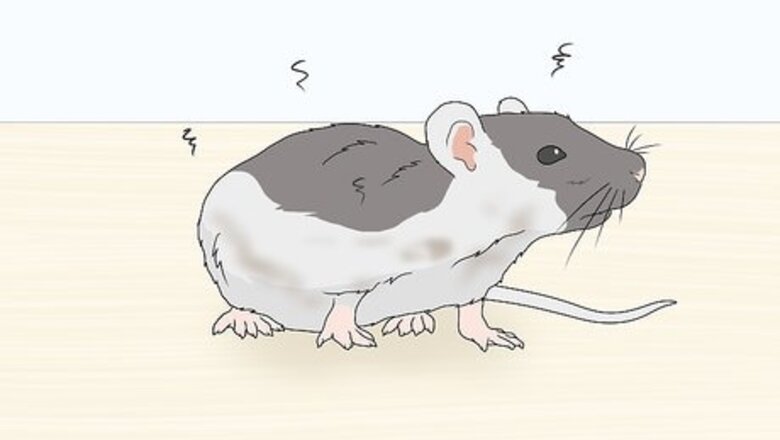
views
X
Expert Source
Brian StarrRat Specialist & Breeder
Expert Interview
If your fuzzy friend begins to smell, it's most likely coming from a dirty cage or old bedding. Give your rat a gentle bath and take the time to clean everything in its cage. Wipe down the cage itself and maintain it throughout the week to keep it smelling fresh.
Washing Your Rat
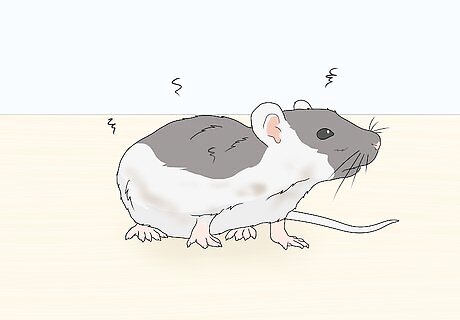
Bathe your rat when it becomes smelly or dirty. Your rat probably does a pretty good job cleaning itself most of the time. However, if your rat smells bad, its fur is dirty, it's sick, or it's struggling to clean itself, you might need to give it a bath. Try to limit the number of baths you give your rat to about 1 a month. If you wash your rat too often, you'll strip its skin of natural oils, which can make your pet smellier.
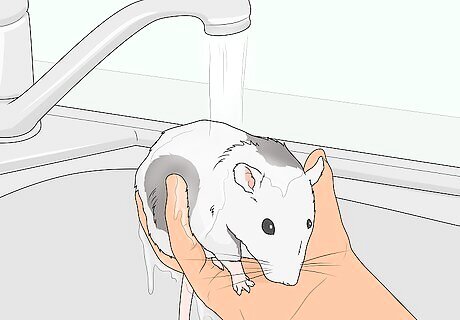
Wet your rat with warm water. Take your rat to the bathroom or kitchen sink and run warm water from the tap. Check the temperature so it's not too hot for your rat. Then, hold your pet under the water until it's completely wet. If your rat doesn't like getting wet, hold it in the sink. Use your hand or a cup to slowly pour the water over your rat and keep the water out of its face. Remember that this is probably a little strange or scary for your pet!
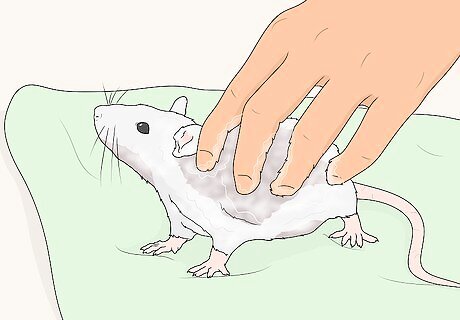
Massage its fur with rodent or cat shampoo. Set a clean towel next to the sink and place your wet rat on it so it's comfy while you bathe it. Squeeze a few drops of rodent or cat shampoo into your hands and rub them together to make a lather. Then, rub the shampoo into your rat's fur. Scrub gently and be careful around its face so you don't get soap in its eyes. Don't use human shampoo on your rat since it can strip the oils from your pet's skin and make it dry out. If you're using cat shampoo, avoid medicated shampoo like flea or tick shampoo.
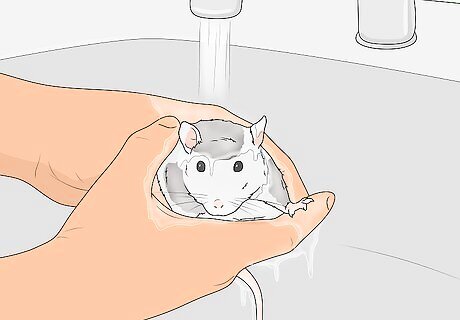
Rinse your rat under warm running water. Once your rat's fur is soapy, turn the lukewarm water back on and hold your rat under the running water. Protect its face while you rinse all of the shampoo out of its fur. If your rat still looks dirty, shampoo it again. This time, use a soft toothbrush to gently rub the shampoo into its skin and fur.
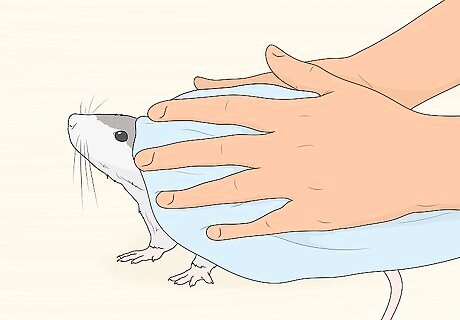
Dry your rat and reward it with a treat. Spread a soft, dry towel next to you and place your rat on it. Gently wrap the towel around it so it feels warm and secure. Wipe its fur to remove most of the moisture. This is a great chance to cuddle with your pet and reassure it. To create another positive association with bathtime, give your rat a treat. For a treat, offer chopped apples, grapes, or its favorite fruit. If your rat likes being brushed, comb their fur as it dries.
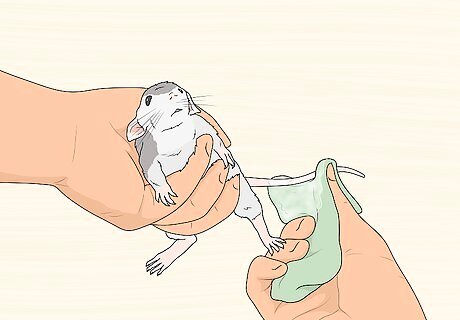
Wipe your rat's tail with soapy water whenever it's dirty or smells. If your rat doesn't do a great job of cleaning its tail, it might look dirty or start to smell like urine. Take a soapy cloth and gently wipe near the base of the tail down to the narrow tip. Keep wiping until the tail is clean. Don't pull too hard on the tail or you might hurt your pet. If the tail is really dirty, you might need to repeat this or give your rat a bath so the tail can soak in soapy water.
Maintaining the Cage Daily
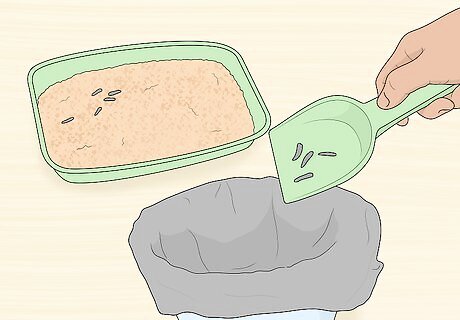
Remove soiled litter and bedding as soon as you see it. Make your rat's cage a pleasant space and check it for poop and urine-soaked bedding or litter every day. If you see it, put on gloves and remove it from the cage. This is one of the easiest ways to cut back on rat odor. You rat need to be in a cage with good ventilation, because the ammonia from the urine can damage their lungs and rats have very sensitive respiratory systems. If you can smell their cage, it's probably not in great condition. Since rat poop and urine can carry disease, it's important to wear gloves and wash your hands after handling the waste. Cat litter made out of compressed recycled paper is a great bedding, because it's very absorbent and can't be kicked out of the cage by the rat.
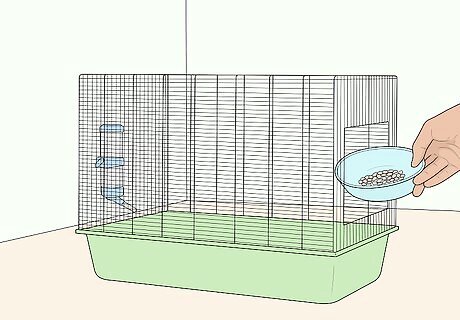
Swap out old food and water daily. Your rat doesn't want to eat out of a dirty food dish, so throw out old food every day and wash the dish. Remember to also rinse out the water container and put fresh water into it. If you leave food in the cage, especially fresh produce, for a long time, it can rot and make the cage smelly.
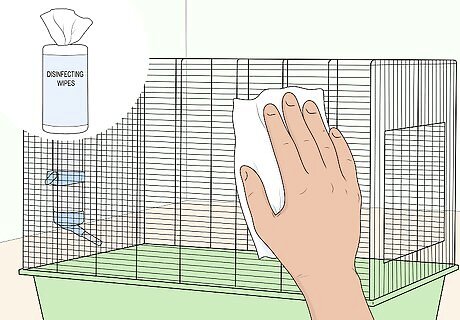
Wipe down the cage with fragrance-free cleaning wipes. If you're regularly removing poop and urine-soaked litter, the cage shouldn't smell too bad. If you do notice a slight odor, spot clean the cage by wiping down the bars with fragrance-free disinfecting wipes. If the cage still smells after you've tidied up and spot-cleaned, it might be time to do a deep clean.
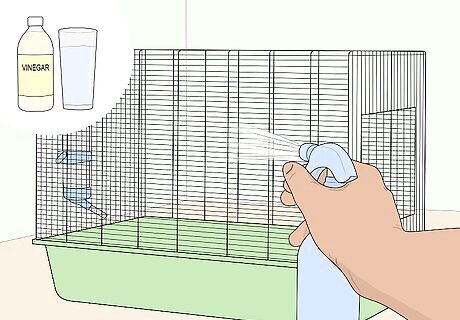
Spray the area around the cage with diluted vinegar to remove odors. Don't forget that the space around your rat's cage can become smelly or dirty over time. To get the area smelling fresh, put equal parts of white vinegar and water into a spray bottle and spritz the solution on the area around the cage. Then, wipe it down with a clean cloth or paper towel. If the cage is in the corner, wipe down the wall too. Put your rat in a safe area away from the cage when you clean so it isn't bothered by the strong vinegar smell. You can also place an open box of baking soda near the cage to absorb odors.
Performing Weekly Cleaning
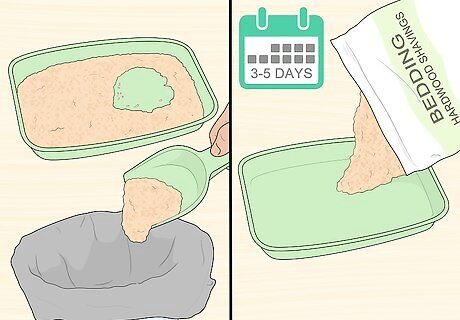
Change the bedding every 3 to 5 days. Scoop out old bedding and replace it with ⁄2 to 1 inch (1.3 to 2.5 cm) of fresh bedding to give the cage a clean smell. You can use hardwood shavings, newspapers, or non-toxic pellets. These are all great at absorbing odors and your rat will love fresh, comfy bedding. Avoid using toxic wood shavings like cedar or pine since these can cause organ problems in rats. Instead, use something like aspen chips or flakes.
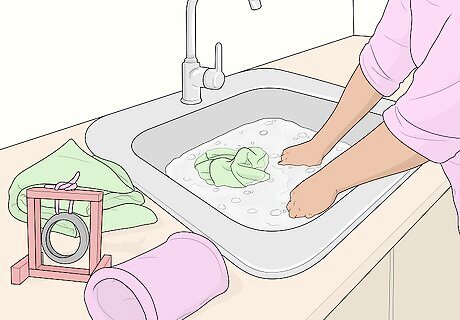
Clean soft items every 3 to 5 days so they smell fresh. If there's fleece, soft toys, fabric hammocks, or blankets in your rat's cage, they can absorb urine and get stinky. Take them out of the cage and wash them with unscented hypo-allergenic laundry detergent. Then, dry them thoroughly without using fabric softener or dryer sheets before you put them back. Have a stockpile of soft items that you can put into the cage as soon as you remove soiled things. Then, you can wait until you have enough soiled items to toss in the wash.
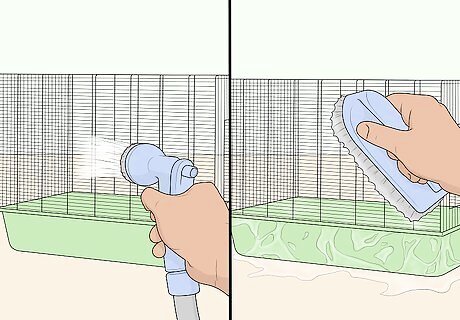
Deep clean the cage once a week. Your rat might feel distressed by you deep cleaning its cage, so put it in a safe place away from the cage. Take everything out of the cage and spray the entire cage with warm water to loosen dried urine and dirt. Then, scrub the inside and outside of the cage with hot soapy water. Rinse the cage thoroughly and let it dry completely before you put things back into it. If you can, clean the cage outside and leave it to dry in the sun.
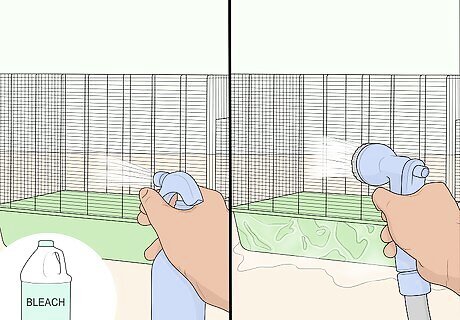
Disinfect the cage 1 to 2 times a month. For a deep clean that kills odor-causing germs, take everything out of the cage and clean it as usual. Then, spray the cage with diluted bleach solution and let it sit for 10 minutes before you rinse the cage with clean water. To make a diluted bleach solution, fill a spray bottle with 1 part bleach and 10 parts water.




















Comments
0 comment